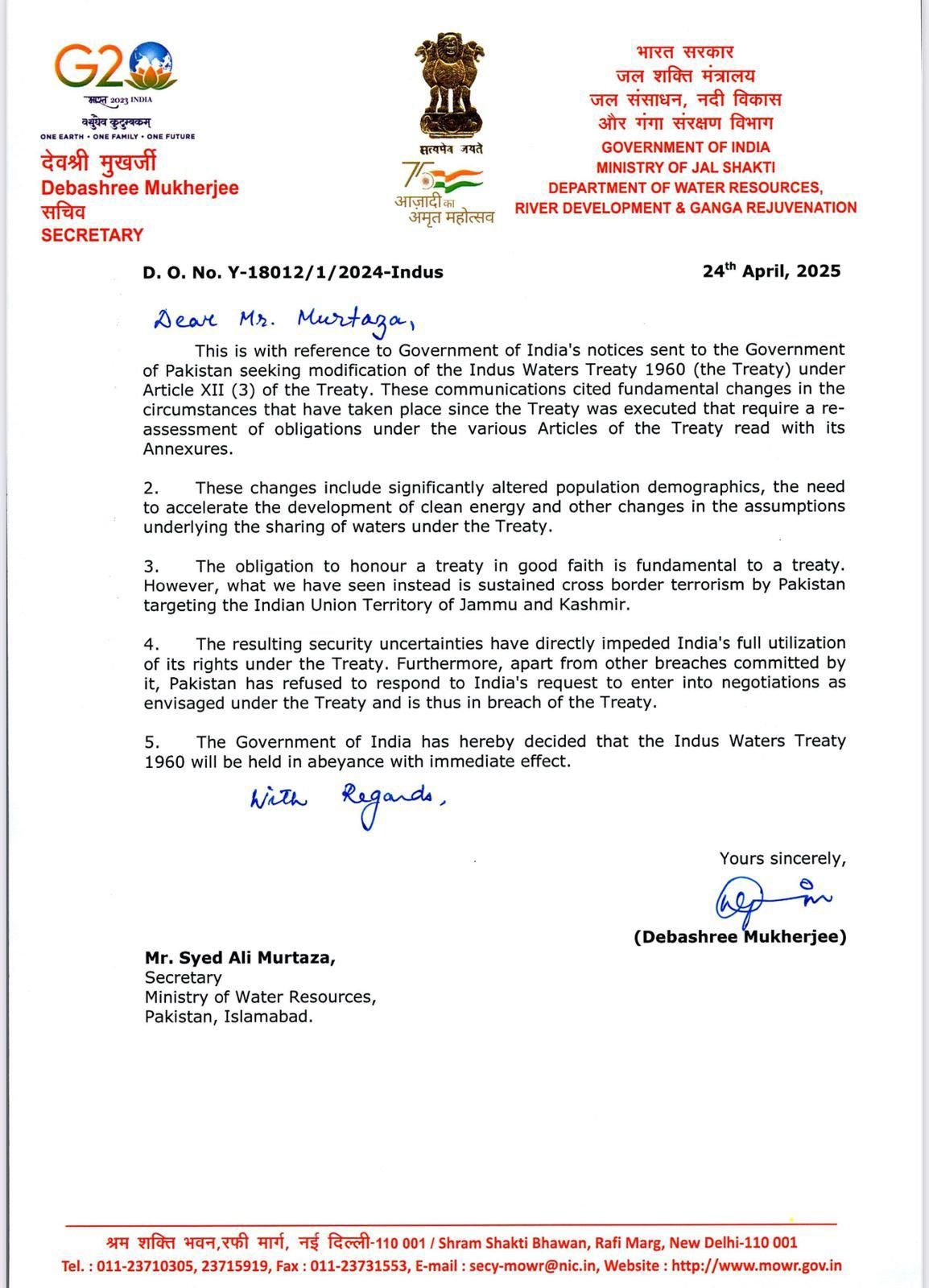
Union Home Minister Amit Shah will likely lead a meeting this evening at his residence in the national capital to discuss the Indus Water Treaty.
Alongside Shah, Union Minister for Jal Shakti, CR Patil and other senior government officials will participate in the discussions.
Sources confirmed to ANI, “India has formally notified Pakistan in writing about the suspension of the Indus Water Treaty.”
The Ministry of Jal Shakti Secretary, Devashree Mukherjee, communicated this decision to the Pakistani government through a letter sent to Syed Ali Murtaza, the Secretary of Pakistan’s Ministry of Water Resources.
The letter from India formally notifies Pakistan of changes to the treaty, citing significant alterations in circumstances since its execution.

It pointed to changes in population demographics, the development of clean energy, and various factors impacting water distribution.
Furthermore, the letter highlighted Pakistan’s support for cross-border terrorism in Jammu and Kashmir, which India claims has hindered its full utilisation of the treaty’s provisions.
Article XII (3) Invoked For Suspension
In the letter, India invoked Article XII (3) of the Indus Waters Treaty, which allows for the modification of the agreement under specific circumstances.
“These communications cited fundamental changes in the circumstances that have taken place since the Treaty was executed that require a reassessment of obligations under the various Articles of the Treaty read with its Annexures,” the letter noted.
It further added, “These changes include significantly altered population demographics, the need to accelerate the development of clean energy and other changes in the assumptions underlying the sharing of waters under the Treaty.”
Security Issues & Breach Of Treaty
The letter stated that the duty to uphold a treaty in good faith is essential to its foundation.
“However, what we have seen instead is sustained cross-border terrorism by Pakistan targeting the Indian Union Territory of Jammu and Kashmir. The resulting security uncertainties have directly impeded India’s full utilisation of its rights under the Treaty,” the letter further stated.
It further added, “Furthermore, apart from other breaches committed by it, Pakistan has refused to respond to India’s request to enter into negotiations as envisaged under the Treaty and is thus in breach of the Treaty. The Government of India has decided to suspend the Indus Waters Treaty 1960 with immediate effect.”
In response to the Pahalgam terror attack, Jal Shakti Minister CR Patil led a series of meetings yesterday to accelerate the implementation of the Prime Minister’s directive regarding the suspension.
Consequently, the Government of India has decided to suspend the Indus Waters Treaty of 1960 with immediate effect, in response to the terrorist attack in Pahalgam.
This decision follows a Cabinet Committee on Security (CCS) meeting chaired by Prime Minister Narendra Modi on 23 April, attended by senior government figures, including Defence Minister Rajnath Singh and External Affairs Minister S Jaishankar.
The attack on 22 April in Pahalgam, which killed 26 tourists while leaving several others injured, was a key factor prompting the Indian government’s decision.
This suspension of the treaty marks a significant step following the attack, which targeted tourists at Baisaran meadow.
Indus Waters Treaty
The Indus Waters Treaty, signed in 1960 after extensive negotiations between India and Pakistan with the World Bank’s mediation, has been a vital framework for the management of the waters of the six rivers of the Indus basin.
It has endured several periods of tension and conflict but has remained one of the most successful international treaties of its kind.
The treaty allocates the western rivers (Indus, Jhelum, and Chenab) to Pakistan, while India has rights to the eastern rivers (Ravi, Beas, and Sutlej).
To read more such news, download Bharat Express news apps



















